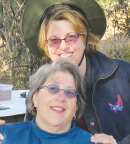
I am fortunate to have an oncologist who treats Roz and me with the respect all patients deserve and wish that every LGBT cancer survivor could have the same experience when facing a cancer diagnosis.— Janet Weinberg (front), and her partner Roz Richter
Tweet this quote
Despite my breast cancer diagnosis 4 years ago, I feel really lucky. My cancer was detected relatively early, stage IIB, during a routine mammogram screening—a test that many of my lesbian friends skip because they don’t want to deal with a medical system steeped in a heterosexual culture that is insensitive to their needs. I understand how they feel.
Married 10 months prior to my diagnosis to my long-time partner, Roz Richter, I, too, have felt the sting of sexual orientation bias, including thoughtless questions from medical personnel asking if I’m covered under my “husband’s” insurance plan or if my “husband” will be joining me in the exam room. There is a sexual-identity assumption in the medical world—and in society generally—that unnecessarily exacerbates the fear and isolation lesbian, gay, bisexual, and transgender (LGBT) patients already feel when they get a cancer diagnosis.
And that feeling of fear and isolation continued throughout my recovery. Although treatment for my estrogen receptor–positive cancer was pretty standard—a lumpectomy to remove the tumor in my right breast, plus an adjuvant chemotherapy regimen of cyclophosphamide, methotrexate, and fluorouracil and 32 rounds of radiation therapy because 3 lymph nodes tested positive for cancer—I developed an abscess along the surgical incision, which put me in the hospital for 18 days.
When you’re in a hospital for any amount of time, especially when it’s for a cancer-related illness, you need the comfort of your family, and, of course, it was important to have Roz with me during those long days. And although Roz’s presence eased my distress, unfortunately, it added to the anxiety of my roommates, who were uncomfortable seeing two women holding hands and being affectionate; we had to isolate ourselves even further by drawing the curtain between our beds. Even though having to protect our privacy in that way was painful, my main concern was for my roommates, who were clearly more ill than I was and for whom I felt a moral duty not to add to their distress.
Health-Care Discrimination
The discrimination the LGBT community faces in health care is not new. My personal experience with it dates back to the 1980s, at the height of the HIV/AIDS epidemic. I was not HIV-positive, and I was hospitalized for an illness unrelated to HIV/AIDS, but I was still stigmatized because I’m lesbian. Social workers walked past my room, refusing to talk with me; the food service staff would not deliver meals.
That long history of discrimination and lack of accessibility to culturally competent health-care services prevents friends of mine from seeking out cancer-screening tests and even badly needed support care after a loved one dies. A friend of mine who lost her spouse to breast cancer visited a cancer support group only to be rebuffed by the other women in the group, who couldn’t identify with her loss and didn’t know how to incorporate her into the group. She never sought out bereavement care services again and continues to suffer from the loss of her spouse.
Mitigating Health-Care Bias
I am fortunate to have an oncologist who treats Roz and me with the respect all patients deserve and wish that every LGBT cancer survivor could have the same experience when facing a cancer diagnosis. Today, my cancer is in remission, and I’m taking an aromatase inhibitor to reduce my risk of recurrence; rather than a burden, I find taking the medication comforting.
As I said previously, I’m lucky. I believe having a mammogram saved my life and want all women to have that same chance, so I’ve become a screening advocate, especially for women in my community. I know that dealing with bias toward lesbians—and gay men and transgender people—among health-care providers is difficult and often the experience can be embarrassing and humiliating, but my message to other lesbians is they must risk whatever indignities they may encounter and be proactive in their health care, because it could save their lives, as it did mine.
And for the oncology community, my message is health care–related bias—not just against the LGBT community but against any minority group—is unacceptable and needs to be mitigated, so everyone receives equal treatment and an equal chance at a cure. Just making us feel welcome is a start. ■
Ms. Weinberg, who lives in New York City, is Executive Vice President of Educational Alliance, a social institution that has been serving downtown Manhattan since 1889.

